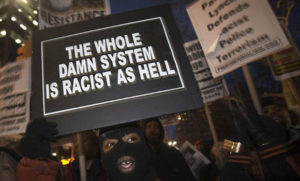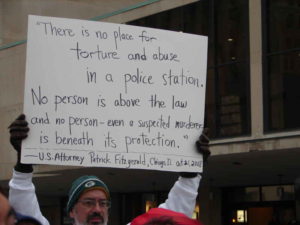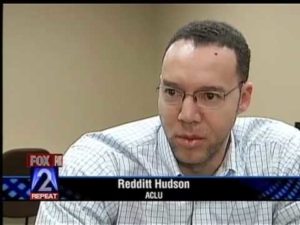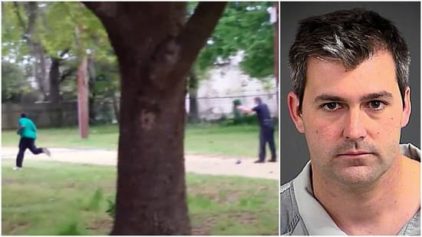
Are they a force plagued with racism who are willingly taking the lives of Black citizens all across the nation? Are they the heroes of today who valiantly serve their communities and have now been vilified thanks to the misdeeds of a few crooked cops?
According to a Black ex-cop who spent years serving with the St. Louis Police Department, the answer is somewhere in the middle.
In an essay published by Vox, Redditt Hudson explains one theory about the entire police force that he still believes based on his own experiences in the force.
“…15 percent of officers will do the right thing no matter what is happening,” Hudson writes. “Fifteen percent of officers will abuse their authority at every opportunity. The remaining 70 percent could go either way depending on whom they are working with.”
It’s because, according to Hudson, the actual culture that thrives within police departments is somewhat contagious.
Whether it’s by encouraging officers to follow in the footsteps of a corrupted cop or simply pushing officers into silence as they witness discrimination and abuse, it’s a culture that can render that 70 percent of officers to easily fall into the grasps of racism regardless of their own race.
“It is not only white officers who abuse their authority,” Hudson writes. “The effect of institutional racism is such that no matter what color the officer abusing the citizen is, in the vast majority of those cases of abuse that citizen will be black or brown. That is what is allowed. And no matter what an officer has done to a black person, that officer can always cover himself in the running narrative of heroism, risk and sacrifice that is available to a uniformed police officer by virtue of simply reporting for duty.”
So while the vast majority of officers are not necessarily malicious villains, the environment created by corrupt officers and a culture of a lack of accountability could still push “good cops” to wear the mask of an evil doer on certain occasions.
It’s a part of the sheer power of corruption.
“About that 15 percent of officers who regularly abuse their power: a major problem is they exert an outsize influence on department culture and find support for their actions from ranking officers and police unions,” he continued.
He pointed to the now infamous Chicago Police commander, Jon Burge, as a prime example.
Even if you haven’t heard Burge’s name before, it’s far more likely that you have heard about the horrendous crimes that were carried out during his time in charge.
From the 1970s to the early ’90s, Burge served as the head of an entire group of rogue cops who brutally beat innocent citizens until they provided the officers with false confessions to crimes they didn’t commit.

Hudson insists that’s a very optimistic and unlikely idea.
“How many officers ‘under the command’ of Commander Burge do you think didn’t know what was being done to these men,” he questioned. “How many do you think were uncomfortable with the knowledge? Ultimately, though, they were okay with it. And Burge got four years in prison and now receives his full taxpayer-funded pension.”
While the 15 percent of blatantly malicious cops don’t make up the majority of the force, it’s their impact on others that poses such a widespread problem in police departments across the globe.
Hudson even recounted his own experience of seeing his colleague snatch a young Black man on crutches from his home and slam him to the ground before brutally punching him in the face and groin.
By the time another officer arrived on the scene, the female officer who beat the young man told the other officers that the Black boy had assaulted her. Hudson knew that wasn’t the case and before his very eyes he witnessed the young man’s brutal arrest due to nothing more than a lie.
The unfortunate reality is that such lies are extremely common in law enforcement even though such corruption is hard for many to believe.
As Hudson pointed out, very few would have believed the story about a police officer fatally shooting an unarmed man in the back multiple times and then planting his Taser next to him to support his story of a struggle when there wasn’t one.
It’s a false story that could have easily allowed South Carolina officer Michael Slager to avoid any and all accountability while Walter Scott’s family was left burying a loved one whose life was taken entirely too soon.
But the cellphone video captured by a bystander allowed the entire nation to be reminded of the existence of dishonest police officers that have become comfortable living above the law.
“If not for that video recording that later surfaced, the report would have likely been taken by many at face value,” Hudson continued. “Instead we see that Slager shot Scott repeatedly and planted the Taser next to his body after the fact.”
For that reason, Hudson believes “every officer in the country should be wearing a body camera that remains activated throughout any interaction they have with the public while on duty.”
In addition to police body cameras, Hudson says citizens must be made to feel comfortable filming police while on duty as long as they are not interfering with their duties.
It won’t be enough to solve the issues plaguing law enforcement but at the very least it could help hold more officers accountable for their actions.
But in the midst of such a dark realization — that the very men and women hired to protect us are easily susceptible to corruption at the hands of the theoretical 15 percent — there still remains the other 15 percent that Hudson describes.
The percentage of officers who truly want to combat police brutality, the ones who joined the force for the right reasons and the ones who truly want to dedicate themselves to finding justice for all people regardless of their race.
Many of these officers belong to the National Coalition of Law Enforcement Officers for Justice, Reform and Accountability.
It’s a “new coalition of current and former law enforcement officers from around the nation” who want to “fight institutional racism in our criminal justice system and police culture,” Hudson explains.
It’s a group that serves as a glimmer of hope that perhaps one day, a system created on a systematically racist foundation, will one day evolve into true a collection of neighborhood heroes who are ready to defend and protect all citizens — including Black ones.



